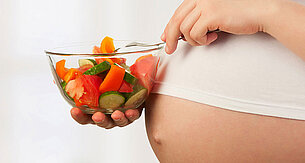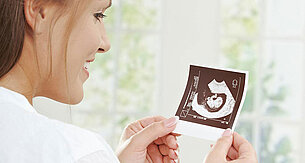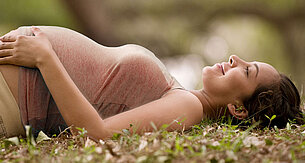Pregnancy weeks:
Week 13 of pregnancy: Your baby begins to develop into a unique human being
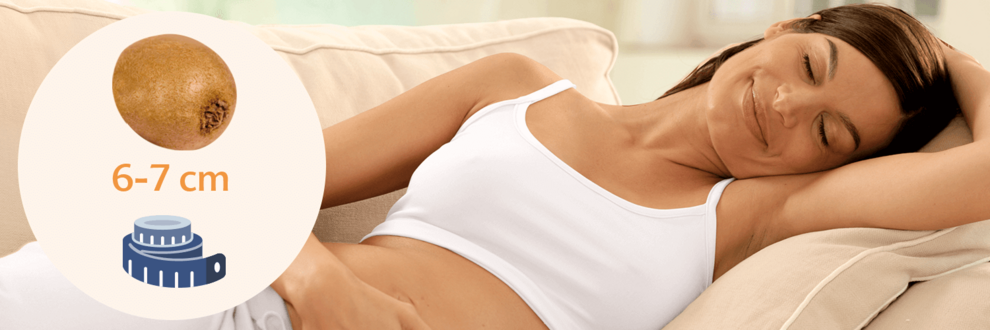
For the most part, your body has now adapted to the changing levels of hormones. The symptoms you experienced in the first three months have disappeared, and hopefully you can now enjoy your pregnancy to the full. Your baby is now 12 weeks old, so you are in the third month of your pregnancy and the last week of the first trimester.
Size of the foetus in week 13
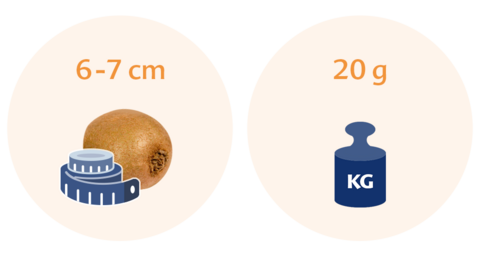
Your baby will now be around 6-7 cm in size, so about as large as a kiwi fruit. They’ll weigh around 20 grams, roughly the same as a strawberry.
Your baby’s development
Week 13 represents a special growth spurt for your baby. While they’re rapidly getting longer and longer, their proportions are gradually taking shape and evening out so that they develop more recognisable human features and begin to resemble a newborn baby. Their little face continues to develop its features on the basis of the genetic information from you and your partner, so that it’ll be obvious from their appearance that they take after both of you.
Their pancreas is now producing insulin, a hormone the human body needs to break down sugar.
By week 13, your baby’s intestine is also in position and ready for substances to pass through it. As they’ve begun to swallow the amniotic fluid, this means that they’ll start having bowel movements.
There’s still plenty of space in your womb for your baby to do some pretty impressive gymnastics, and they’ll also be training their sucking reflex by sucking on their thumb. They’ll turn more and more towards the abdominal wall, sensing what’s going on outside and responding to stimuli from you. Perhaps that's why you intuitively like to put your hands on your belly?
What it’s like for the mum-to-be in week 13
You don’t need to suppress your cravings – as long as you’re eating a balanced diet overall, you can have a little bit of what you fancy!
There’s still plenty of time to think ahead and plan how things are going to be: there are still another 27 to 29 weeks to go before you’ll be able to happily hold your baby in your arms. If your pregnancy were a book, you’d now have read about a third of it.
Common signs and symptoms
A whirlwind of thoughts
Lots of things will be running through your head right now, and you won’t be able to stop thinking about pregnancy. You’ll want to learn from the experiences of women who are already mothers and get an insight into their thought processes. Something else to deal with is the reactions of everyone who knows about your pregnancy, which will range from the more sensible to the more gushing, and all their arguments and opinions will have an influence on you.
Listen to what your mind and body are telling you, and take regular time out to be alone with your thoughts. Remember to communicate with your baby by laying your hand on your belly – they can now sense it and respond.
Unfortunately, though, you won’t be able to feel their movements for a few weeks yet. Women expecting their first child usually begin to feel their baby move gently from around week 18.
The symptoms of the first few weeks subside
All these external influences can take their toll on you, so it’s good that you’re feeling much better and the symptoms of the first few weeks of your pregnancy have largely disappeared. However, you may still feel a slight pulling sensation in your abdomen from time to time (because your womb is constantly getting bigger and the round ligaments supporting it are stretching), and your breasts will also continue to feel tender and painful.
Happily, there are simple, gentle ways to relieve both of these symptoms. One of the most helpful is to make sure you are calm and relaxed: the ever-popular yoga or specific pregnancy exercises can help in this case.
Questions you may want to ask your doctor
Detailed diagnosis
During the examination, your doctor will pay close attention to the size of various parts of your baby. One important part of their development which can now be measured is something called nuchal translucency, the appearance of an accumulation of tissue fluid at the fissure of the neck. In the coming weeks, this fissure will completely disappear. The amount of tissue fluid indicates whether your baby has any problems such as a heart defect or whether they have Down’s syndrome. This test is not routine, however, so ask your doctor if you want to know more.
Toxins from your home, your immediate environment and the wider world
Dyeing your hair
More and more women are becoming aware of the issue of dyeing their hair during pregnancy and of the toxic chemicals in many dyes. Although many women think dyeing and perming their hair is harmless, the Straubing women’s clinic in Germany advises against it because of the high absorption capacity of the scalp. You are advised to avoid dyes and perms in the first three months of pregnancy, as the scalp absorbs the harmful toxic substances very well and thus can pass them on via your bloodstream to your baby. Natural hair dyes are a good compromise (though unfortunately there aren’t any in blonde), and another option is to dye strands of hair no closer than 2 cm from your scalp.
Household cleaning products
The best thing to do if you’re unsure whether it’s safe to use the cleaning products you have at home is to ask your doctor, as they can tell you which ingredients in household cleaning products can harm the embryo or foetus. If you’re still not convinced, switch to natural, organic cleaning products (this will help your baby in the long run) or contact an institute that specialises in research into the effect of toxic chemicals on embryos. They’ll be able to give you the most accurate information about the effects of the ingredients in question and how you can avoid them.
Other chemicals
The same applies to products you use in the garden, where it’s better to be safe than sorry: chemical weedkillers are probably best avoided, for example. There’s a good chance that you’ll be doing some interior redecorating before the baby arrives, and if so, you should use natural products such as beeswax or whiting instead of chemical wall paints or wood varnish.

